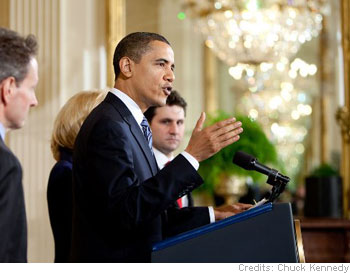 President Obama today offered a set of proposals for helping America’s troubled middle class. All are sensible and worthwhile. But none will bring jobs back. And Americans could be forgiven for wondering how the President plans to enact any of these ideas anyway, when he can no longer muster 60 votes in the Senate.
President Obama today offered a set of proposals for helping America’s troubled middle class. All are sensible and worthwhile. But none will bring jobs back. And Americans could be forgiven for wondering how the President plans to enact any of these ideas anyway, when he can no longer muster 60 votes in the Senate.
The bigger news is Obama is planning a three-year budget freeze on a big chunk of discretionary spending. Wall Street is delighted. But it means Main Street is in worse trouble than ever.
A pending freeze will make it even harder to get jobs back because government is the last spender around. Consumers have pulled back, investors won’t do much until they know consumers are out there, and exports are miniscule.
In December 1994, Bill Clinton proposed a so-called “middle class bill of rights” including more tax credits for families with children, expanded retirement accounts, and tax-deductible college tuition. Clinton had lost his battle for health care reform. Even worse, by that time the Dems had lost the House and Senate. Washington was riding a huge anti-incumbent wave. Right-wing populists were the ascendancy, with Newt Gingrich and Fox News leading the charge. Bill Clinton thought it desperately important to assure Americans he was on their side.
Two months later, Clinton summoned Dick Morris to the White House to figure out how Clinton could move to the right and better position himself for reelection. The answer: Balance the budget.
But in 1994, Clinton’s inconsistencies didn’t much matter. The U.S. economy was coming out of a recession. It was of no consequence that Clinton’s jobs proposals were small or that he moved to the right and whacked the budget, because within a year the great American jobs machine was blasting away and the middle class felt a lot better. Dick Morris was not responsible for Clinton’s reelection. Nor was Clinton’s move to the right. What reelected Bill Clinton in 1996 was a vigorous jobs recovery that was on the way to happening anyway.
Today, though, there’s no sign on the horizon of a vigorous recovery. Jobs may be coming back a bit in the next months but the country has lost so many (not to mention all those who have entered the workforce over the last two years and still can’t land a job) that it will be many years before the middle class can relax. Furthermore, this recession isn’t like other recessions in recent memory. It has more to do with problems deep in the structure of the American economy than with the ups and downs of the business cycle.
Like Clinton’s, Obama’s package of middle class benefits is small potatoes. They’re worthwhile but they pale relative to the size and scale of the challenge America’s middle class is now facing. Obama can no longer afford to come up with lists of nice things to do. At the least, he’s got to do two very big and important things: (1) Enact a second stimulus. It should mainly focus on bailing out state and local governments that are now cutting services and raising taxes, and squeezing the middle class. This would be the best way to reinvigorate the economy quickly. (2) Help distressed homeowners by allowing them to include their mortgage debt in personal bankruptcy — which will give them far more bargaining leverage with morgage lenders. (Wall Street hates this.)
Yet instead of moving in this direction, Obama is moving in the opposite one. His three-year freeze on a large portion of discretionary spending will make it impossible for him to do much of anything for the middle class that’s important. Chalk up another win for Wall Street, another loss for Main.
- Bulenox: Get 45% to 91% OFF ... Use Discount Code: UNO
- Risk Our Money Not Yours | Get 50% to 90% OFF ... Use Discount Code: MMBVBKSM
Disclaimer: This page contains affiliate links. If you choose to make a purchase after clicking a link, we may receive a commission at no additional cost to you. Thank you for your support!



Leave a Reply